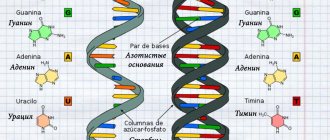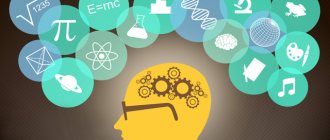Phenomenal memory is an amazing phenomenon. This definition refers to the ability to exclusively quickly memorize information and its subsequent reproduction. Moreover, the material can have amazing volumes in the complete absence of a semantic connection between its components. That is, if a person with such ability is given a piece of paper with a random set of letters, numbers, images and symbols, he will remember it, no matter what.
The rudiments of memory begin to form in a person in the womb, at 5 months of pregnancy
Thus, the embryo learns to remember and recognize sounds and reacts positively to the mother’s voice and familiar music. The peak of memory development occurs at the age of 19-25, which is why this time is great for getting an education. Well, memory fades after 50, and only in people who don’t train it. For example, the same teachers, actors or researchers can maintain clarity of mind until death due to the characteristics of the profession, which forces them to constantly memorize large amounts of new information.
Memory abilities
A similar set of functions, responsible for cognitive processes, storage and reproduction of data, exists in all animals with a developed central nervous system. This ability has achieved the greatest progress in humans.
- There are two known stages of adding information to the biological data store: short-term and long-term memory.
- The first one is easy to destroy with anesthesia, electric shock and other influences - in any case, it “lives” no longer than a few tens of minutes.
- Long-term memory ideally lasts throughout a person's life. It is quite resistant to the influences described above.
- When moving from one type of memorization to another, certain chemical processes are activated. Even unusual memory works with the help of special substances - neurotransmitters that communicate between neurons.
- There is also a third memory mechanism. However, it works at the level of instincts. Sensory memory receives information from the senses. Closing his eyes, a person sees the silhouette of what was in front of him a second ago. This is this type of memorization. It is short-lived and quickly replaced by new data.
- Some experts add collective and external memory to this list. The first one stores the totality of human knowledge, and the second one contains books, computers and other ways to store information outside the brain.
Memory in human life - arguments and facts
plays a fundamental role in human life
Memory helps us accumulate life experiences. Thanks to the fact that we remember the events that happened to us, we are clearly aware of who we are, what the characteristics of our personality are and what relationships we have with others.
At the same time, there are some things that seem to be erased from our memory. This process is called forgetting, and it is characteristic of every person. To understand why this is so, it is enough to imagine what would happen if we remembered everything?
American scientists have been trying to unravel the mysteries of memory They are studying the phenomenon of Jill Price's limitless memory. Incredible but true: this woman can describe in detail every day of her life, starting from the age of eleven!
Many would envy such a wonderful ability, but Price herself considers her gift a curse:
- Because of her phenomenal memory, she can remember in detail all the tragic events that happened in her life, for example, the death of her husband.
- Jill relives quarrels with loved ones, illnesses and other unpleasant moments every time as if it were yesterday.
- Often her peculiarity prevents her from focusing on the real situation and leading a normal life.
Thus, forgetting is a kind of defense mechanism for humans. It allows us not only to separate important information from unimportant information, but also to maintain a stable mental state. This is why people are more likely to remember the good and forget the bad.
№9
False memories are much more common than you think. Simply put, almost everything you remember is not 100% reliable. For example, if you witnessed a robbery and saw the robber, you can roughly remember his appearance. If someone talks about how they had a picture of a frog on their T-shirt, your brain may begin to add that image to the memory. And then you will be sure that he really had a frog on his T-shirt. Although, in fact, you have not seen her. The same thing happens with memories that are stored for a very long time. Over time, they become distorted and become not 100% reliable.
What is memory in psychology
Memory
- This is one of the most important cognitive processes. Thanks to it, we are able to retain information about past phenomena and events in our consciousness, compare them with current phenomena and make decisions based on this, act, and predict the future. A good memory is a guarantee of success in a particular activity.
It is common knowledge that memory can be trained and improved. However, we often don’t think about what type of memory we need to “pump up”. Therefore, it is necessary to understand these types.
How to develop
Those who do not have innate eidetic abilities should not be upset, because this type of memory can be developed. How quickly this can be done depends on individual characteristics and frequency of training.
Aivazovsky method
It is believed that the artist I.K. Aivazovsky had eidetic memory. He could mentally not only reproduce a picture of a seascape in motion, but also stop it at any moment. This is what allowed him to depict the storm, waves, splashes, colors of the sky and other details of seascape painting with such precision.
In psychology there is even a separate method for developing eidetic memory, which bears his name. It's quite simple to master:
- Choose one item.
- Watch him closely for 4-5 minutes.
- Close your eyes, mentally imagine it and describe it to the smallest detail (color, size, shape, details).
- Open your eyes, compare the real and the images reproduced in your thoughts, notice what was missed.
- Repeat the exercise from the very beginning.
- Do this until the images completely match.
Each time you need to choose more complex objects (you can start with a TV and end with a picture) and gradually reduce the observation time.
Exercises to develop photographic memory
Exercise 1. Unforced observation
While walking, count the number of houses on both sides of the street, the floors in them, shops, trees, cars parked in the parking lot and other little things that can be counted. Save your findings on the way back. At home, reproduce all the numbers you remember.
Exercise 2. Associations
When memorizing any information, present it in the form of pictures. Moreover, they must be built on incredible associations that cannot exist in life. Psychologists say that this is one of the most effective techniques to improve eidetic memory in a short time. Example. You need to buy milk, a loaf of bread and toilet paper at the store. We present the following phantasmagoria: a loaf of bread, dressed (wrapped) in toilet paper, drinks milk.
Exercise 3. Textual criticism
The goal is to develop photographic memory for texts.
Print out an A4 sheet with text you are unfamiliar with. Read it carefully and remember it as much as possible. Ask someone to add 2-3 new words to it and print it out again. The task is to find fresh inclusions as quickly as possible.
Exercise 4. Palindromes
Read all signs and names out loud backwards.
To develop eidetic memory, numerous board and online games “Find 10 differences/cat/words/objects”, “Paired pictures”, and any attentiveness tests are also suitable.
Neurobics
Helps train eidetic memory and neurobics - gymnastics for the brain. The most effective exercises:
- Constantly go to the same place (to work, to the store) using different routes and at the same time do the casual observation exercise (see above).
- Once a week, from morning to evening, do all the manipulations that you are used to performing with your right hand with your left (brush your teeth, hold a spoon, write).
- Once a day, read a highly intelligent text on a topic about which you understand nothing. Try to delve into every word and grasp the meaning.
- When answering someone's questions, watch the construction of your speech. Speak as if you were writing an essay. At the same time, everything said must be clearly reproduced in the head in the form of text.
- Mute the TV and try to understand what is being said on the screen. Then test yourself (recordings of the programs can be found on the Internet).
So you don't have to be born with the phenomenon of photographic memory. You can develop it yourself. Of course, it will not be as bright and voluminous as that of eidetics, but you can learn to quickly memorize and reproduce a sufficient amount of information.
Unusual memory: historical examples
What is so characteristic of a person’s memorization, which never ceases to amaze? Here are a few examples of phenomenal memory that will shock you and allow you to better imagine the capabilities of the brain.
- The thinker from Ancient Rome Marcus Porcius Cato the Elder is not only the author of the catchphrase “Carthage must be destroyed!”, He was distinguished by his extraordinary abilities in the field of memorization. Cato the Elder was able to reproduce all the words that came out of his mouth throughout his life. The speeches of Marcus Porcius Cato the Elder were often recorded, so comparison with the original left no doubt about the capabilities of the thinker's brain.
- The founding father of Athenian democracy, politician and commander Themistocles remembered each of the citizens of his native city by name. But at that time there were 20 thousand inhabitants in Athens!
- Seneca, a philosopher from Ancient Rome, memorized up to 2 thousand words at a time when they were pronounced in disarray and made no sense.
- The great commander Alexander the Great knew by name every warrior in his 30,000-strong army. Perhaps because of this, people followed him even to India.
- Unusual human memory abilities were demonstrated by chess player Paul Morphy. He played “blindly”, without casting a single glance at the board. So the genius could lead up to 8 games.
- Mathematician Leonhard Euler is a Swiss, German and Russian scientist. He is the author of more than 850 scientific papers. Euler was able to pronounce six powers of numbers from 1 to 100.
- Academician from the USSR Sergei Alekseevich Chaplygin was distinguished by an amazing memory for telephone numbers: once he dialed it, the scientist remembered the order of numbers for the rest of his life.
- In 1805, Napoleon's troops took Rubens' famous painting "On the Altar of St. Peter's Church" from the Cologne Museum. The artist, who wished to remain anonymous, created an exact copy of the masterpiece from memory, which even specialists found difficult to distinguish from the original.
- Jean-François Champollion was the first to decipher the Rosetta Stone and learn to read Egyptian hieroglyphs. Already at the age of 16, the young genius studied 12 languages and presented his first scientific work, “Egypt under the Pharaohs,” to the Grenoble Academy. At the age of 20, Champollion, in addition to his native dialect, already spoke 13 languages, including Chinese, Arabic and ancient Greek.
This is not a complete list of examples of enchanting human memory. Such opportunities seem fantastic and are inherent only to extraordinary people. However, every representative of the human race can develop the unusual abilities of memory and the human brain. There are various trainings and manuals that help to better unlock the potential of mental development. By wisely using the capabilities of memory, you can achieve greater success in life, learn better, learning a lot of new information. This will also allow you to avoid dangerous situations and not fall for the tricks of scammers and manipulators. Developed memory will make it possible to perceive life more fully and remember for a long time the best and brightest moments of the years lived.
Leading memory characteristics
When talking about the leading characteristics of memory, we mean the following components:
- Volume (we call people with a high indicator of this characteristic erudites. If, of course, the accuracy of reproduction is high).
- Memorization speed (if it is high, then we say that such a person “grabs everything on the fly.” This parameter takes into account how much time or how many repetitions a person needs to memorize).
- Duration of information storage (how long a person remembers the learned material. The expressions “memory is short” and “angry and with a good memory” are about this).
- Accuracy of memorization (how many errors were made during reproduction? How accurately is the meaning conveyed?).
- Resistance to interference.
- Readiness to reproduce - speed of response (for example, the ability to quickly think, respond resourcefully. This is an indicator of how quickly and easily a person can remember what he needs).
The effectiveness of memory is determined by its volume, the accuracy of information transfer and the duration of its storage, which means improving memory means improving these individual components.
№7
We are lucky to live in the digital age. Many of us have unlimited access to the Internet and vast amounts of information. It’s great when you have a gadget and the Internet at your fingertips, which allows you to find out everything in the shortest possible time (and not run to the library, as before). However, these same digital technologies have played a cruel joke on human memory. Research has shown that our brains are less likely to remember information when they know they can easily access it again. He believes that there is no point in “cluttering” his memory with something that is very easy to obtain.
Sphere of interests and inclinations of the individual
The division of individual characteristics of memory in psychology according to this criterion is based on the facts of selectivity of perception, and, consequently, memory. If the information is interesting and necessary for a person, then it is remembered better, fitting into the system of already acquired knowledge. Information that is not within a person’s sphere of interest is sometimes completely ignored by him.
Individual characteristics of a person’s memory depend on the level of development of its individual processes, on the characteristics of higher nervous activity, on upbringing, on environment and training, on habits, on the nature of professional requirements, on the subject and method of memorization. The type of memory can be developed and improved using special exercises. The more facets of perception we use, the more fully we perceive, the better the results of memorization will be.
Individual memory characteristics may manifest themselves in different ways. Sometimes they are expressed in the extraordinary development of memory in general, and sometimes in the phenomenal, incredible productivity of its individual types. History contains many examples of extraordinary memory, among them:
- Nikola Tesla, an outstanding physicist, inventor, engineer, had a unique photographic memory. He rarely entered notes, keeping everything “in his head.” They say that when his laboratory was destroyed by fire at the end of the 19th century, he restored many of his inventions from memory.
- Sergei Rachmaninov, pianist, composer and conductor, easily memorized passages from complex musical works. However, he memorized notes with the same ease.
- Ivan Aivazovsky, an outstanding marine painter, painted most of his canvases from memory (and in total he painted about 6,000 works).
- Wiltshire Stephen, an architectural artist from Britain, is able, once he has seen architectural landscapes, to accurately reproduce them from memory.
This list can be very long...
№5
The hippocampus is a horseshoe-shaped region of the brain that plays an important role in consolidating information from short-term memory to long-term memory. It is part of the limbic system, which is associated with emotions and long-term memories. The hippocampus is involved in complex processes such as the formation, organization and storage of memories. Because the two sides of the brain are symmetrical, the hippocampus is found in both hemispheres. With age, the hippocampus loses neural connections (on average, before the age of 80, a person loses up to 20% of all neural connections). This, accordingly, leads to memory deterioration.
№4
Each of us has heard about amnesia, a disease in which a person loses memory (or loses the ability to create it), in particular, forgets what happened recently. But we are sure that not everyone has heard of such a disease as hypermnesia. This is an increased ability to remember and reproduce information. Some may think that this is a good thing and almost a superpower, but in fact it is a disease that needs to be treated. People suffering from this disease store a huge amount of unnecessary information in their heads, which causes them terrible discomfort, since their brain is constantly overloaded.
Reading
Its significance and importance in the process of self-education cannot be overestimated. Reading is a complex cognitive process of symbol decoding that aims to understand text. People with phenomenal memory, as a rule, absorb a lot of literature.
To develop this ability, you need to read. You just need to do it correctly. Having chosen the “right” literature (with sufficient semantic load), you can begin thoughtful and thorough reading.
A person should seem to “catch” every word written in a book with his gaze and immediately analyze it. Surely many have found themselves in a situation where they seem to have read a whole page, but did not understand anything. This is due to lack of concentration and thorough approach. But by noticing every written word, a person will learn to comprehend everything he reads. And then remember it. In the future, you will also be able to develop your reading speed. Phenomenal memory (as an ability) is inextricably linked with the ability to quickly get acquainted with textual information and assimilate it.
Methods of training and development
If a person does not have physiological disorders, he can improve memory function: speed up memorization and increase volume. Simple exercises designed for children and adults are suitable for this.
Development in children
You can notice a lag in the development of memory in children at a young age, but until the age of 3-4 years, parents do not worry about it, and turn to a psychologist when the child is about to go to 1st grade. And although time is lost, the situation can be helped.
To develop visual memory, the “Story Pictures” method is used. Cards are laid out in front of the child, depicting a short story. The preschooler examines it for some time. When he is ready, the adult needs to swap the cards. The child’s task is to restore the sequence of actions. For auditory memory, exercises for memorizing words and numbers are suitable. You need to start with three, gradually working up to 6–7.
Development in adults
You can train your memorization skill with any material: retell the plot of a movie, memorize poems, phone numbers, words of a foreign language. You can study during a break at work, using improvised objects. For example, lay out stationery on the table, take a photo, change places and arrange them as they were in the beginning.
Other types of superpowers
Now we can talk about types of phenomenal memory that are less common than photographic memory. In particular, about hearing.
People who are characterized by it easily remember a huge amount of audio information. Usually musicians can boast of this ability. And many. It is enough for them to hear a musical composition once in order to then reproduce it on their instrument. And some composers even immediately copy the music they like into a music notebook. They don't even need to double-check the correct song by playing it first. Musicians know very well how notes and registers sound. Therefore, transferring what they heard to paper, they mentally play the composition again.
There are also people with phenomenal mathematical memory. And it really can be called a superpower. Because such individuals are capable of performing complex calculations in their minds. And even remember in detail those that were made by them earlier.
People with text memory also surprise us. After all, it is enough for them to read or hear the text once (be it a story, poem, novel, etc.) in order to reproduce it later.
Conclusion
Something is constantly happening in our lives, we are often in a hurry and have to do everything without forgetting anything. Under such conditions, we have difficulty focusing our attention and remembering, but even greater difficulties arise in learning effective ways to remember. Therefore, we recommend that you use the suggested methods and tips on how to develop your memory.
The opinions of the author and the editor may not coincide. Would you like to write a column for Netology? Read our terms of publication.











